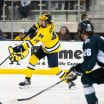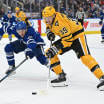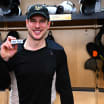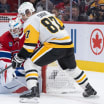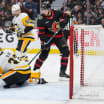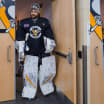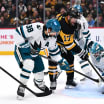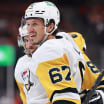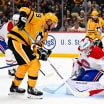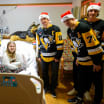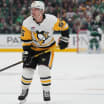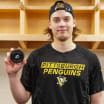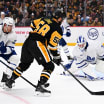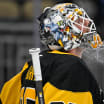RMU alumnus McLaughlin-Bittle relishing chance to work with USA goalies
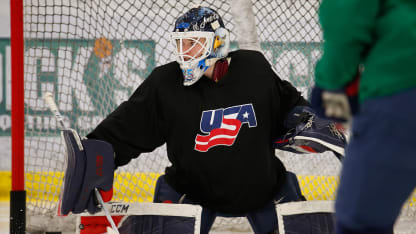
"They hand you these three goalies that are the best and they just make you look good!" she said with a laugh.
Now McLaughlin-Bittle, who played college hockey for Robert Morris University from 2005-09 before becoming a two-time silver medalist with Team USA at the 2010 and 2014 Olympic Games, is getting the chance to experience that firsthand.
The Ohio native is currently serving as the goaltending coach for the U.S. Women's National Team, who is in town this week for their unique joint training camp with Team Canada at UPMC Lemieux Sports Complex (
more on that here
).
Prior to this, McLaughlin-Bittle had been helping out at various Team USA camps and festivals, working alongside then-goaltending coach Steve Taylor. When he left to work for the ADM (American Development Model), it made sense for McLaughlin-Bittle to take over.
"I got to know him pretty well and we're pretty similar in the way that we coach and the things that we utilize," she said. I think it was a pretty easy transition for me to slide in there since I know the team and I know the girls."
It's the first time that she's been fully in charge of the goaltenders, who are
Maddie Rooney
(who starred for Team USA in the Gold Medal Game at the 2018 Olympics),
Alex Cavallini
and
Kaitlin Burt
. And since there's only three of them, McLaughin-Bittle is enjoying the opportunity to get to know them and help improve their games.
"We have a lot of downtime, so it's easier to get involved with them and do some things I want to do," McLaughlin-Bittle said.
It was interesting to hear the unique challenges that these goaltenders face compared to their male counterparts. One big difference is their size. For example, at 5-foot-5, Rooney is nearly a foot smaller than the 6-foot-4 Matt Murray - yet they still need to cover the same amount of net.
"The skills are all the same - the movement, the tracking, the reading the plays," McLaughlin-Bittle explained. "It's just when you're 6-5, you can get away with your mistakes a little bit easier than Maddie can at 5-5."
The biggest keys to overcoming that obstacle, McLaughlin-Bittle said, are athleticism and patience.
"They just have to work on their patience, and they have to be quicker than everybody else," she said. "But if they understand their angles and what they look like at certain depths, it becomes a pretty simple game."
Another interesting parallel is the mindset. After Rooney's legendary performance in the shootout to lead Team USA to gold at the 2018 Olympics, Murray marveled at her poise under "probably as much pressure as you can get" at just 20 years old.
"She looked like she was sleeping!" McLaughlin-Bittle agreed with a laugh.
Which, maybe, she was.
"I tell everyone I kind of just blacked out," Rooney recalled with a laugh. "I don't even remember what I was thinking. But I mean, I just remember the aftermath being the dogpile on me. It was an amazing feeling. I can't really describe what I felt in the moment."
Murray has said repeatedly that being a goaltender is all about the mental aspect - which is taken to another level, at this level of women's hockey.
"It's huge and probably more so in the women's game then the men's," McLaughlin-Bittle said. "Because (the men) are playing an 82-game roster and have a chance to, if they have a not-so-good game, come back two days later and work through things. Whereas these girls come together every couple months and some of them are preparing 365 days to play one game. That can be a little taxing on your brain."
While McLaughlin-Bittle understands exactly what they're going through, she tries to take more of a hands-off approach when it comes to that part of the game.
"They're all professionals at this point for the most part," she said. "They know what makes them tick. Some goalies like to be really loose before games and some goalies like to be super serious. I'm not a big fan of changing that."
Her approach to coaching, McLaughlin-Bittle said, is to take bits and pieces from every coach that she had in the past and to build her own style.
"The most important thing is just making sure they have honest feedback all the time, and just keeping them loose," she said.
In addition to her work with Team USA, McLaughlin-Bittle honed that style both as an assistant coach with RMU from 2011-13 and working with youth hockey players and teams in the area, as she currently resides in Moon.
When she heard that Team USA would be coming to her part of the country this week, she was ecstatic - especially since that meant she wouldn't have to be away from her 9-month-old son Carter.
"I was so pumped," she said with a laugh. "This is right in my backyard. We've got a lot of free time and I can go home and see (my son). It's nice. I wish we had this six years ago when I was playing, this would have been wonderful to play in my hometown. This is pretty special to be here."
It was also especially meaningful since McLaughlin-Bittle has been working hard to help grow the game in western Pennsylvania, particularly on the girls' side, ever since she was playing at RMU.
"I know pretty much 95 percent of the little girl's hockey players around here," she said. "To see them in the stands watching this is pretty cool. That's something I'm invested in here in Pittsburgh, is growing the women's side. And having them be able to watch the best women's hockey in the world with Canada and the U.S. just goes along with everything that I'm trying to do here."
Back in her college days, McLaughlin-Bittle remembers working with the girls who played for Team Pittsburgh - which was essentially the only all-girls team in the area. Now, there's the Little Penguins Learn to Play all-girls sessions, the entire DICK'S Sporting Goods Penguins Elite girls' program and numerous other girls' teams.
From 2008-09 - McLaughlin's senior season - until 2018-19, girls' hockey in the area grew a whopping 76.7 percent. That statistic says it all about the efforts of the Penguins and people at the grassroots like McLaughlin-Bittle to get more girls playing the game.
"It starts with the little ones, it starts with getting them involved in the sport and the Penguins have been huge with getting the girls involved in what they're trying to do," she said. "I think it's been a pretty good joint effort with the women's team at Robert Morris, having that right there, along with the Penguins' efforts. It seems like it's a lot of work and then you blink an eye and it's been 10 years and we're like, 'This is what we wanted!' It's been pretty cool."


